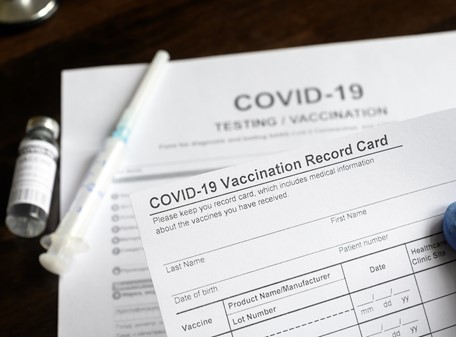Brian Cressman is an associate at MacDonald Illig Attorneys and a member of the firm’s Business Transactions, Trusts & Estates, Real Estate, and Education Law Practice Groups.
Since the pandemic started, the state and federal governments have imposed a number of new requirements on employers. Most recently, the governments’ focus has trained on increasing the vaccination rate. While many businesses instituted vaccination policies already, the federal government sought to expand vaccinations by issuing a number of wide- ranging vaccination mandates applying to federal contractors, businesses subject to the jurisdiction of the Centers for Medicare & Medicaid Services, as well as OSHA’s vaccination-or-negative-test requirement for large employers. All of these mandates are subject to litigation currently.
This article does not address the legality of any of the vaccination mandates, but instead provides guidance regarding insurance and benefit issues related to vaccinations, whether subject to a mandate or pursuant to a company policy.
Vaccination Incentives
Under Equal Employment Opportunity Commission (EEOC) guidance, an employer is permitted to offer incentives for its employees to become vaccinated. However, the permissible value of the incentive varies based on whether the vaccine is administered by the employer or its agent, or by an independent service provider. Where the vaccination is
administered by the employer or its agent, the incentive must “not be so substantial as to be coercive.” However, if an employer simply offers an incentive to employees to voluntarily get vaccinated by an unaffiliated service provider, i.e. the employee’s primary care physician or a pharmacy, then an employer is not subject to the aforementioned limit on incentives.
Premium Discounts or Surcharges Based on Vaccination Status
The Departments of Labor, Health and Human Services, and Treasury announced joint guidance that permits employers to reward or penalize group health plan members on the basis of receiving a COVID-19 vaccination or not. While the Employee Retirement Income Security Act of 1974 (ERISA) generally does not permit premium differentials, there is an exception to this rule for “wellness programs.”
Under the joint-guidance, an employer may give premium discounts for receiving, or penalize members for not receiving, a COVID-19 vaccination if five criteria are met: 1) employees must be offered an opportunity to qualify for the wellness reward program at least once a year; 2) the reward or penalty, combined with other wellness incentive program rewards or penalties, generally cannot exceed 30 percent of the total cost of employee-only coverage under the plan; 3) the wellness program must be reasonably designed to promote health or prevent disease; 4) the wellness program must provide a reasonable alternative for the reward for those who cannot obtain the vaccination (i.e. employees allergic to a component of the vaccine); and 5) employees must be provided notice of the wellness program, including information on obtaining the vaccination-based reward, the reasonable alternative, and, if applicable, availability of a waiver.
Leave Requirements if Subject to a Government Mandate
If injunctions are lifted, the three federal mandates — for large employers, the Centers for Medicare & Medicaid Services (CMS) rule, and the federal contractor rule — all differ in terms of leave requirements.
The Occupational Safety and Health Administration (OSHA) large employer mandate, applying to employers with 100+ employees and requiring their employees be vaccinated or provide a negative test weekly, requires employers to provide reasonable paid leave for employee vaccinations and to recover from side effects of the vaccination.
The federal contractor mandate, on the other hand, does not expressly address paid leave. Similarly the CMS rule doesn’t address paid leave. However, another OSHA rule, issued June 21, 2021, requires covered healthcare employers to provide each employee reasonable time and paid leave for vaccination and to recover from side effects following vaccination.
Conclusion
The end of COVID vaccination issues is far from over. New requirements will be coming, and existing guidance will likely change. However, regardless of the context, an employer must keep its employees’ vaccination information confidential.
If you have any questions about vaccination issues at your workplace, please contact a MacDonald Illig attorney at 814/870-7600.












